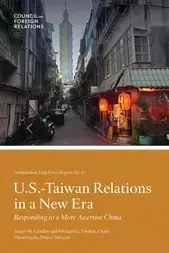- Iran
- Israel-Hamas
-
Topics
FeaturedIntroduction Over the last several decades, governments have collectively pledged to slow global warming. But despite intensified diplomacy, the world is already facing the consequences of climate…
-
Regions
FeaturedIntroduction Throughout its decades of independence, Myanmar has struggled with military rule, civil war, poor governance, and widespread poverty. A military coup in February 2021 dashed hopes for…
Backgrounder by Lindsay Maizland January 31, 2022
-
Explainers
FeaturedDuring the 2020 presidential campaign, Joe Biden promised that his administration would make a “historic effort” to reduce long-running racial inequities in health. Tobacco use—the leading cause of p…
Interactive by Olivia Angelino, Thomas J. Bollyky, Elle Ruggiero and Isabella Turilli February 1, 2023 Global Health Program
-
Research & Analysis
Featured
Terrorism and Counterterrorism
Violence around U.S. elections in 2024 could not only destabilize American democracy but also embolden autocrats across the world. Jacob Ware recommends that political leaders take steps to shore up civic trust and remove the opportunity for violence ahead of the 2024 election season.Contingency Planning Memorandum by Jacob Ware April 17, 2024 Center for Preventive Action
-
Communities
Featured
Webinar with Carolyn Kissane and Irina A. Faskianos April 12, 2023
-
Events
FeaturedJohn Kerry discusses his work as U.S. special presidential envoy for climate, the challenges the United States faces, and the Biden administration’s priorities as it continues to address climate chan…
Virtual Event with John F. Kerry and Michael Froman March 1, 2024
- Related Sites
- More

Centers & Programs
Asia Program
Asia’s rise will define the twenty-first century. Pressing matters in East, South, and Central Asia—from North Korea’s nuclear program to the economic ascension of China and India—have global implications far beyond the region’s borders. And what happens in Asia will shape and be shaped by American foreign policy, society, and trade. The Asia program at the Council on Foreign Relations informs policymakers, business leaders, and the public at large about the complex future that lies ahead for the world’s largest and most economically dynamic continent.
60% share of the world’s population living in Asia
Featured
An uptick in the number of new marriages in 2023 is likely a only temporary blip rather than a long-term change from China's steady transition to a rapidly aging society.
China's decline in economy and influence might indicate its unlikeliness to displace the United States as a leading global power in the foreseeable future. This development calls for a reevaluation of the U.S. policy towards China.
As conflict intensifies in the Middle East, India's government attempts to juggle relations in the region.
China and India compete for leadership of the Global South, but it remains unclear whether either is winning.
Bangladesh’s unfree election is part of a larger trend of democratic regression in South and Southeast Asia.
This interactive map tracks China’s growing maritime influence through investments in strategic overseas ports. Users can plot the location of each port and view satellite images alongside detailed information on the share of Chinese ownership, the total amount of Chinese investment, and the port’s suitability for use by the Chinese military.
As China turns the page from its reform era, the Chinese Communist Party's official discourse increasingly references the country's imperial past.
The national security trial of Jimmy Lai, founder of Apple Daily and pro-democracy activist from Hong Kong, is scheduled to take place this December. Please join our speaker, Caoilfhionn Gallagher KC, accomplished human rights lawyer leading the international legal team defending Mr. Lai and an expert in accountability for crimes against journalists, to discuss the case of Jimmy Lai and Apple Daily and the wider ramifications for media freedom and the rule of law in Hong Kong and across the region.
Hearing on Security on the Korean Peninsula
Mr. Chairman, I am pleased to have the opportunity to testify before this committee on the security situation on the Korean Peninsula. We have just …
Chair Cleveland, Chair Glas, and members of the Commission, thank you for inviting me to testify before the Commission. I appreciate the opportunity to appear before you today to testify abo…
Although a conflict in the Taiwan Strait has thus far been avoided, deterrence has dangerously eroded. To maintain peace, the United States must restore balance to a situation that has been allowed to tilt far too much in China’s favor.
Itochu Corporation Managing Executive Officer Chino Mitsuru Claire shares about her path to corporate leadership.
The alliance between the United States and South Korea has endured through seven decades of shifting regional and geopolitical security contexts. Yet it now faces challenges from within. Domestic pol…
-
India has emerged as a major global power capable of shaping events beyond South Asia. Experts from CFR and elsewhere examined the future of India and how the country’s economic trends, domestic politics, and foreign relations have affected its rise and viability as a critical international actor. Click here to download the full agenda for the symposium. This event is made possible by the generous support of the Hauser Foundation. Members may invite a guest to this symposium. ZOOM LOG-IN INFORMATION: Session One: “India’s Economic Rise—Continued Ascent or Turbulence Ahead?” 12:30 p.m.–1:30 p.m. (EST) Zoom Meeting ID: 822 3976 8558 Zoom Password: 2023hauser Numerical Passcode (for dial-in ONLY): 3109191337 Session Two: “India’s Democracy—Resilient or Endangered?” 1:45 p.m.–2:45 p.m. (EST) Zoom Meeting ID: 872 9900 5680 Zoom Password: 2023hauser Numerical Passcode (for dial-in ONLY): 6358635415 Session Three: “Indian Foreign Policy in an Era of Geopolitical Competition” 3:00 p.m.–4:00 p.m. (EST) Zoom Meeting ID: 854 0627 4482 Zoom Password: 2023hauser Numerical Passcode (for dial-in ONLY): 9603236685
-
Diplomacy and International Institutions
Nina Hachigian, special representative for subnational diplomacy at the U.S. Department of State, and Alyssa Ayres, dean of the Elliot School of International Affairs at George Washington University … -
Panelists discuss Japan under Prime Minister Fumio Kishida’s leadership and examine Japan’s domestic challenges, security posture in the face of escalating geopolitical tensions, and regional economic goals.
-
Panelists discuss the cost of China’s zero-COVID policy, the country’s dwindling economic growth, and the consequences of China’s economic slowdown at home and on its international economic relations.
-
Since China’s ascendancy toward great power status began in the 1990s, many observers have focused on its economic growth and expanding military power. In contrast, most viewed China’s ability to project soft and sharp power through its media industries and its global influence campaigns as quite limited, and its ability to wield influence within the domestic politics of other countries as nearly nonexistent. In Beijing's Global Media Offensive, Joshua Kurlantzick offers an incisive analysis of China’s attempt in the past decade to become both a media and information superpower around the world, and to wield traditional forms of influence to shape the domestic politics of other countries. The CFR Fellows’ Book Launch series highlights new books by CFR fellows.
 Online Store
Online Store

















